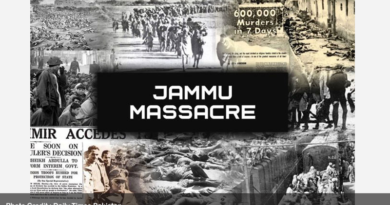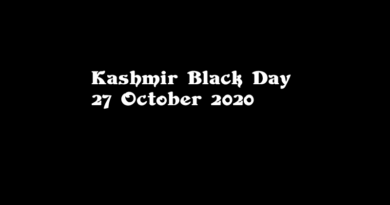When 21 Kashmiris were massacred by Dogra
IT WAS REVOLT AGAINST ATROCITIES
When 21 Kashmiris were massacred by Dogra soldiers
It was revolt against atrocities on July 13, 1931 when people rose against the autocratic Dogra rule and protested against the prosecution of the architect of Kashmir’s struggle, Abdul Qadeer Khan Ghazi.
On the 80th anniversary of 1931 uprising, in which 21 Kashmir fell prey to bullets of Dogra soldiers, historians find similarities between the unarmed agitation and ongoing protests in the Valley.
“The bloody history of 1931 is repeating itself on the Valley streets. After 80 years, Kashmiris are still receiving bullets in response of slogans,” prominent historian, Fida Muhammad Hasnain who has extensively researched the 1931 uprising, told Greater Kashmir.
He said in 1931, the Kashmiri Muslims for the first time had risen against the autocratic rule of the Maharaja.
“From the housetops, the men and women raised revolutionary slogans .The Maharaja had failed to curb this upsurge. Like the ongoing protests, demonstrations over the killings by Dogra soldiers had spilled over across the Valley. Kashmir observed strike for 19 days. The Dogra soldiers continued the killing spree by killing unarmed protesters in Maisuma, Habba kadal, Nawakadal and Jamia Masjid,” he said.
He said to quell the protests over the killing, the Maharaja was forced to make changes in administration. He appointed Pandit Hari Kishan Koul as the new Prime Minister of the State and issued orders for the release of political prisoners. Noted poet Zareef Ahmad Zareef said Abdul Qadeer was moved by plight of the Kashmiris under Dogra rule. He showed Kashmiris the way to live a respectable life.
THE UPRISING
Hasnain said the 1931 uprising had started after Abdul Qadeer Khan had raised his voice against oppression unleashed on the Kashmiris. He said Khan came into prominence after his speech during a public meeting convened by Youngmen Muslim Association on June 21,1931. The meeting among other was attended by a Muslim leader, Sheikh Muhammad Abdullah (who later became Prime Minister and Chief Minister of Jammu and Kashmir).
Hasnain said in his speech, Sheikh Abdullah, asked all Muslims to unite and fight for their rights. He also appealed to the Pandits to join hands with Muslims for redressal of grievances and for independence. “Just when the meeting was to be concluded a well-built Pathan of about 36-40 years in age, came to the platform and started delivering an inflammatory speech,” he said.
FIERY SPEECH
“The honour, respect and reverence of the Holy Qur’an is dearer to the Muslims than the rulership of the world. They will never tolerate any interference in their religion or defilement of their Holy Book. The government of the Maharaja does not care for his subjects. It has no touch with the people, nor any sympathy for the downtrodden. Oh, Muslims arise!
“I warn you that your representatives and memorials cannot come to your rescue, nor will these papers remove injustice and misery. Such things cannot solve the issue relating to the defilement of the Holy Quran. You must stand on your legs and fight against the autocratic force.”
Hasnain said the speech, was heard by the people as well as by the leaders in complete silence. “No one dared to stop him and there was much commotion among the gathering, who felt bewildered because upto that moment they had not heard anyone uttering a single word against the Maharaja. Now they raised slogans of Allaha-o-Akbar and went on encouraging the speaker.
At the end of speech, the fiery speaker pointed towards the Shergarhi Palace of the Maharaja and cried in loud voice ‘Demolish this edifice of injustice, cruelty and subjugation” Hasnain said quoting the eyewitness.
He said after the speech, the people started moving towards Khan while the Muslim representatives made enquiries as to who was this Pathan who had made the fiery speech. “It came to light that this man of wheatish colour, sharp eyes, big face with curved moustaches had come with a tourist to Kashmir. Later, it was learnt that he was a disciple of Maulana Jamal-uddin Afghani, a foremost Muslim philosopher of the 20th century, who had also visited Kashmir before his departure to Russia via Pahalgam,” he said.
THE TRIAL
For his “seditious” speech Abdul Qadeer was arrested on the 25th of June, 1931 under section 124-A and 153 of the Penal Code. His trial started on the 4th of July in the Court of the Sessions Judge, Srinagar. During the four hearings on the 4th, 6th, 7th and 9th, a large crowd of Muslims would assemble in the compound of the Court to witness this trial. Hasnain said under such circumstances the Judge shifted his court to Jail premises on the July 11, 1931.
“This trial was the first case of a political nature in the State and attracted much attention of the people. The Muslims of the State were sympathetic towards the Khan and thousands of the people would assemble in the Court to know the fate of the prisoner. As such, there was an imminent danger of turmoil. It needs to be recorded that no lawyer came forward to defend the Ghazi except Maulvi Abdullah Vakil,” he said.
Finally, Khan’s trial was started in Srinagar Jail premises. Hasnain says in order to provide protection to the Magistrate, all extra preparation had been made. The Deputy Inspector of Police came to the site of the trial with one Inspector, 2 Sub Inspectors, 5 Head Constables, 44 Policemen. Out of this force 22 policemen were armed with riffles and the rest with hand clubs, while the Inspectors had revolvers. Besides the above, the Jail forces consisted of 119 policemen armed with dandas and 19 policemen with rifles.
He said before arrival of the Session Judge, a large gathering of the Muslim had gathered on the road leading to the Jail compound. And when the Judge arrived in his car, escorted by the police the people shouted, ‘Our brother from Raibareli! Release Abdul Qadeer! Our brother from Rawalpindi! We will go to the jail. Imprison us instead’
“The Jailor had told the Judge that the people wanted to have Khan’s glimpse but the Judge refused to give any permission. Khan was brought out of the Jail to the court at 2 p.m. and the people got much excited and raised slogans of Allaha-o-Akbar. The Sessions Judge ordered the mob to disperse but they requested for permission to offer prayers. The police arrested 5 persons with the result the people got agitated,” he said.
THE MASSACRE
He said one amongst them Khawaja Abdul Khaliq Shora stood up and gave a call for prayers and loudly pronounced the Azan. “He was fired upon by a police man and fell down dead on the ground. This agitated the people and they started protesting. After this two ranks of 10 policemen fired on the mob but it had no effect on the people.”
Later the magistrate ordered three rounds but the people continued to shout Allaha-o-Akbar and Islam Zindabad.
“Many were injured in this firing and the police started arresting people. The first man to be arrested was Khawaja Muhammad Yahya Rafiqi. Some of the protestors entered the Jail Office and picked up charpoys for carrying the martyrs and the wounded. The police had used about 200 rounds of ammunition and arrested 32 persons in the initial stage,” he said.
Hasnain said the Dogra rulers utilized the services of its military and cavalry forces. “They resorted to beating the people with spears and sticks. They wanted to snatch away the dead bodies from the people but they confronted them bravely and proceeded towards the Jamia Masjid. The wounded were carried towards the nearby Mission Hospital Rainawari and some towards the clinic of Dr Abdul Wahid. In all 22 persons had died due to firing in the first instance while 6 more died of police firing later. The military took over the City and killed 3 Kashmiris in Nowabazar who were raising slogans. It also resorted to looting of some Muslim houses. All corpses of the martyrs were laid in the compound of Jamia Masjid, Srinagar,” Hasnain said.
Finally the martyrs were buried in the compound of Ziarat Naqishband Sahib (RA) in Shahr-e-Khaas. “The soldiers arrested about 700 Muslims in the city. The next day the leaders of the Muslims, namely Sheikh Muhammad Abdullah, Chaudary Ghulam Abbas, Moulvi Abdul Rahim, Sardar Gohar Rehman were arrested and Sheikh Sahib was locked in a solitary cell of the Hari Parbat Fort,” Hasnain said.
NOBLE SOUL
Till date nobody knows what happened to the revolutionary Abdul Qadeer Khan. Before his rebellion against the Dogra rule, Khan is believed to have worked as a butler with a British Officer in a houseboat in Dal lake.
Former president of the Houseboat Owners Association, M Azim Tuman said his grandfather’s uncle owned a houseboat Patricia in Dal Lake.
“My ancestors told me that in 1931, the houseboat was hired by Colonel Alford Butt a British officer alongwith his wife and children. The family was accompanied by a butler named Abdul Qadeer,” Tuman said.
He said Qadeer used to offer Friday prayers at Hazratbal shrine and in leisure used to feed fish and watch their movements. “When he heard about desecration of Holy Qu’ran by Dogras soldiers in Jammu, he was very furious. He took a big knife from pantry of the houseboat and addressed people at Khankah.
“With this knife I will behead Maharaja. How dare he desecrated Holy Qu’ran,” said Tuman quoting his late father who was among the gathering.
“My father told me later in the evening, an unknown person came to the houseboat and asked Qadeer to accompany him. He was so brave that he rowed a Shikara and went with him. As the Shikara was about to reach the banks, the persons whistled and the Maharaja’s soldiers surrounded it. They arrested Qadeer,” he said.
He said when Col Alford’s wife came to know about it, she rushed to the spot and asked the soldiers to leave Qadeer.
“However, the soldiers told her that Maharaja has issued a warrant against him for speaking against him. Alford’s wife heckled and kicked some soldiers, but they took Qadeer with them. Later, she got him released by furnishing his bail. My ancestors were so afraid of the Dogras, that they bundled Qadeer’s clothes in a sack and threw it into the lake,” he said.
About Author:
ARIF SHAFI WANI is journalist/Writer based in Srinagar, capital city of Occupied Jammu & Kashmir
Courtesy:
http://www.greaterkashmir.com/news/2010/Jul/13/july-13-1931-60.asp


